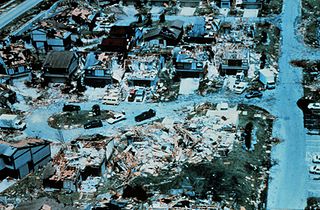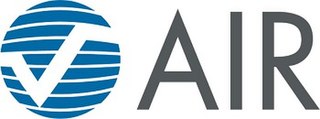
Reinsurance is insurance that an insurance company purchases from another insurance company to insulate itself from the risk of a major claims event. With reinsurance, the company passes on ("cedes") some part of its own insurance liabilities to the other insurance company. The company that purchases the reinsurance policy is called a "ceding company" or "cedent" or "cedant" under most arrangements. The company issuing the reinsurance policy is referred to as the "reinsurer". In the classic case, reinsurance allows insurance companies to remain solvent after major claims events, such as major disasters like hurricanes and wildfires. In addition to its basic role in risk management, reinsurance is sometimes used to reduce the ceding company's capital requirements, or for tax mitigation or other purposes.

Munich Re Group or Munich Reinsurance Company is a German multinational insurance company based in Munich, Germany. It is one of the world's leading reinsurers. ERGO, a Munich Re subsidiary, is the Group's primary insurance arm. Munich Re's shares are listed on all German stock exchanges and on the Xetra electronic trading system. Munich Re is included in the DAX index at the Frankfurt Stock Exchange, the Euro Stoxx 50, and other indices.
Catastrophe modeling is the process of using computer-assisted calculations to estimate the losses that could be sustained due to a catastrophic event such as a hurricane or earthquake. Cat modeling is especially applicable to analyzing risks in the insurance industry and is at the confluence of actuarial science, engineering, meteorology, and seismology.

Markel Corporation is a holding company for insurance, reinsurance, and investment operations around the world. Headquartered in Richmond, Virginia and founded in 1930, Markel reports its ongoing underwriting operations in three segments, and products originate from three insurance divisions and one reinsurance division. Through Markel Ventures, they allocate capital to invest in opportunities outside of insurance.

Catastrophe bonds are risk-linked securities that transfer a specified set of risks from a sponsor to investors. They were created and first used in the mid-1990s in the aftermath of Hurricane Andrew and the Northridge earthquake.
Case management is a managed care technique within the health care coverage system of the United States. It involves an integrated system that manages the delivery of comprehensive healthcare services for enrolled patients. Case managers are employed in almost every aspect of health care and these employ different approaches in the control of clinical actions.
Reinsurance sidecars, conventionally referred to as "sidecars", are financial structures that are created to allow investors to take on the risk and return of a group of insurance policies written by an insurer or reinsurer and earn the risk and return that arises from that business. A re/insurer will only pay ("cede") the premiums associated with a book of business to such an entity if the investors place sufficient funds in the vehicle to ensure that it can meet claims if they arise. Typically, the liability of investors is limited to these funds. These structures have become quite prominent in the aftermath of Hurricane Katrina as a vehicle for re/insurers to add risk-bearing capacity, and for investors to participate in the potential profits resulting from sharp price increases in re/insurance over the four quarters following Katrina. An earlier and smaller generation of sidecars were created after 9/11 for the same purpose.
Alternative risk transfer is the use of techniques other than traditional insurance and reinsurance to provide risk-bearing entities with coverage or protection. The field of alternative risk transfer grew out of a series of insurance capacity crises in the 1970s through 1990s that drove purchasers of traditional coverage to seek more robust ways to buy protection.
Industry loss warranties (ILWs), are a type of reinsurance contract used in the insurance industry through which one party will purchase protection based on the total loss arising from an event to the entire insurance industry above a certain trigger level rather than their own losses.

CRESTA was founded as a joint project of Swiss Reinsurance Company, Gerling-Konzern Globale Reinsurance Company, and Munich Reinsurance Company. CRESTA has set itself the aim of establishing a globally uniform system for the accumulation risk control of natural hazards - particularly earthquakes, storms and floods. Those risk zones are essentially based on the observed and expected seismic activity, as well as on other natural disasters, such as droughts, floods and storms. CRESTA zones regard the distribution of insured values within a region or country for easier assessment of risks. CRESTA Zones are the essential basis for reinsurance negotiation and portfolio analysis. Nowadays, CRESTA sets widely accepted standards which apply throughout the international insurance industry. CRESTA zone information is used by most insurers for assessing the insurance catastrophe premiums they will charge.
Following is a partial list of professional certifications in financial services, with an overview of the educational and continuing requirements for each; see Professional certification § Accountancy, auditing and finance and Category:Professional certification in finance for all articles. As the field of finance has increased in complexity in recent years, the number of available designations has grown, and, correspondingly, some will have more recognition than others. Note that in the US, many state securities and insurance regulators do not allow financial professionals to use a designation — in particular a "senior" designation — unless it has been accredited by either the American National Standards Institute or the National Commission for Certifying Agencies.

SCOR SE is a tier 1 reinsurance company providing Property and Casualty (P&C) and Life reinsurance solutions to its clients. It is one of the leading reinsurers in the world. Created in 1970 with the backing of the French government, its original name was Société Commerciale de Réassurance, hence "SCOR". The SE acronym indicates that the company is a Societas Europaea. In 2007, it became the first French listed company to use the SE acronym in its name.
The International Credit Insurance & Surety Association (ICISA) was founded in April 1928, forming the first trade credit insurance association. The Association is registered in Zurich (Switzerland) under Swiss Civil Code. The Secretariat is based in Amsterdam.

The Hartford Steam Boiler Inspection and Insurance Company (HSB) founded in 1866 and headquartered in Hartford, Connecticut, U.S., is a global specialty insurer and reinsurer. The company is the largest provider of equipment breakdown insurance and related inspection services in North America serving over five million commercial locations.
Insurance-linked securities (ILS) are broadly defined as financial instruments whose values are driven by insurance loss events. Those such instruments that are linked to property losses due to natural catastrophes represent a unique asset class, the return from which is uncorrelated with that of the general financial market.

General Insurance Corporation of India Limited abbreviated as GIC Re is an Indian nationalised reinsurance company. It is under the ownership of Ministry of Finance, Government of India. It was incorporated on 22 November 1972 under Companies Act, 1956. GIC Re has its registered office and headquarters in Mumbai. It was the sole nationalised reinsurance company in the Indian insurance market until the insurance market was open to foreign reinsurance players by late 2016 including companies from Germany, Switzerland and France. GIC Re's shares are listed on BSE Limited and National Stock Exchange of India Ltd.
Captive insurance is an alternative to self-insurance in which a parent group or groups create a licensed insurance company to provide coverage for itself. The main purpose of doing so is to avoid using traditional commercial insurance companies, which have volatile pricing and may not meet the specific needs of the company. By creating their own insurance company, the parent company can reduce their costs, insure difficult risks, have direct access to reinsurance markets, and increase cash flow. When a company creates a captive they are indirectly able to evaluate the risks of subsidiaries, write policies, set premiums and ultimately either return unused funds in the form of profits, or invest them for future claim payouts. Captive insurance companies sometimes insure the risks of the group's customers. This is an alternative form of risk management that is becoming a more practical and popular means through which companies can protect themselves financially while having more control over how they are insured.

Brian Charles Duperreault is a Bermuda-born American executive in the insurance industry. He is executive chairman and former CEO of American International Group.
Caribbean Catastrophe Risk Insurance Facility Segregated Portfolio Company is an insurance company headquartered in the Cayman Islands. The sixteen original member-countries of CCRIF included participants in CARICOM, and the membership of the Board of Directors is selected by CARICOM and by the Caribbean Development Bank.

AIR Worldwide is an American risk modeling and data analytics company headquartered in Boston, Massachusetts, with customers in insurance, reinsurance, financial services, and government markets. AIR specializes in catastrophe modeling software and services to manage the probability of loss from natural catastrophes, terrorism, pandemics, casualty catastrophes, and cyber incidents. It is led by current President Bill Churney and operates nine offices internationally.









